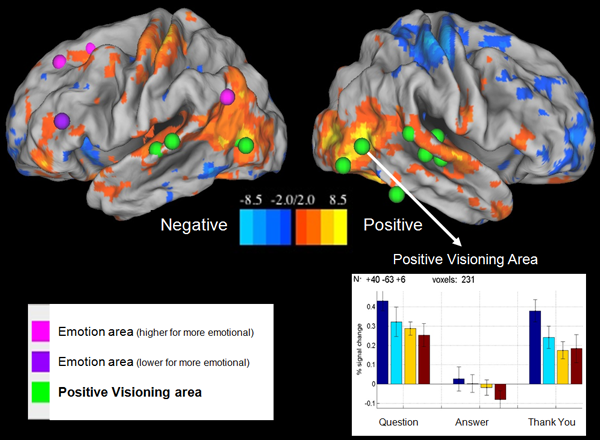Coaching With Compassion Can "Light Up" Human Thoughts

Thanks to @davidrock101 I came across the following article:
From Sify.com:
Researchers at Case Western Reserve University have found that people respond much better to a coach they find inspiring and who shows compassion for them, rather than one who they perceive to be judging them.
"We're trying to activate the parts of the brain that would lead a person to consider possibilities. We believe that would lead to more learning. By considering these possibilities we facilitate learning," said Richard Boyatzis, distinguished university professor, and professor of organizational behaviour, cognitive science and psychology.
..."Students tended to activate the areas associated with visioning more with the compassionate coach, even when the topics they were thinking about weren't so positive," Jack said of the results.
From Physorg.com (with a video at this link)
Internally funded research at Case Western Reserve has documented reactions in the human brain to compassionate and critical coaching methods. The results start to reveal the mechanisms by which learning can be enhanced through coaching with compassion (a method that emphasizes the coached individual’s own goals).
From Sify.com:
Researchers at Case Western Reserve University have found that people respond much better to a coach they find inspiring and who shows compassion for them, rather than one who they perceive to be judging them.
"We're trying to activate the parts of the brain that would lead a person to consider possibilities. We believe that would lead to more learning. By considering these possibilities we facilitate learning," said Richard Boyatzis, distinguished university professor, and professor of organizational behaviour, cognitive science and psychology.
..."Students tended to activate the areas associated with visioning more with the compassionate coach, even when the topics they were thinking about weren't so positive," Jack said of the results.
From Physorg.com (with a video at this link)
Internally funded research at Case Western Reserve has documented reactions in the human brain to compassionate and critical coaching methods. The results start to reveal the mechanisms by which learning can be enhanced through coaching with compassion (a method that emphasizes the coached individual’s own goals).
Neural Signatures of Inspirational Mentoring: The researchers are studying neural responses to different styles of coaching with the goal of improving learning outcomes.
Method: Undergraduate students interacted with two coaches, and later while in the brain scanner responded to questions requiring recall of those coaches. The left and right hemispheres of the brain are seen colored according to whether there was more activity in response to the compassionate coach, who evokes the positive emotional attractor, or the standard coach, who evokes the negative emotional attractor.
Analysis: More brain activity was seen in the positive condition, particularly in higher visual and auditory areas associated with imagery.
-- Brain areas shown by pink spheres showed a more complex pattern, which related to the emotional content of the questions. However, the majority of brain areas identified were positive visioning foci.
-- The pattern for positive visioning foci is shown in the graph. These areas showed consistently more activity for more positive conditions: while the coach was posing the question, while the student responded, and while the coach thanked the student for responding.
-- Positive visioning areas are thought to reflect the greater cognitive and perceptual openness that comes from being encouraged to connect with a vision that inspires you, as opposed to the defensiveness caused by the sense you are being judged or pressured to conform to externally imposed goals.
So, coaches and consultants (and mediators who work beyond just in neutral capacities!), how does this fit into your coaching work?
About
@ADRHub Tweets
© 2026 Created by ADRhub.com - Creighton NCR.
Powered by
![]()
You need to be a member of ADRhub to add comments!
Join ADRhub